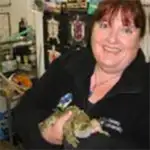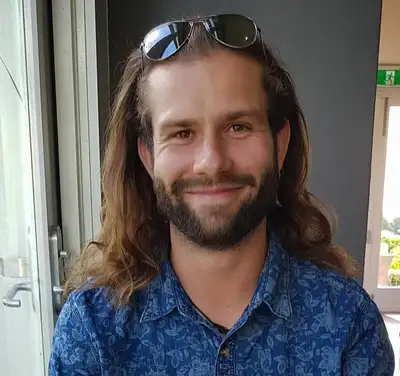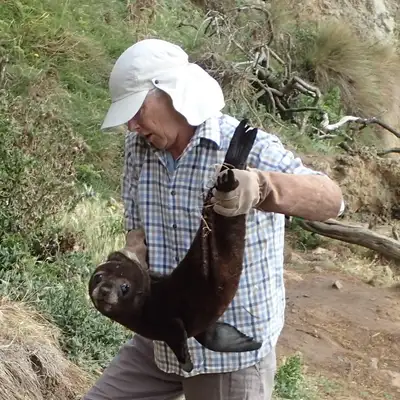About us
Based within the School of Veterinary Science at Massey, the Wildbase Oiled Wildlife Response team collaborates globally through research, education, training and response leadership.
Since 1998, we have partnered with Maritime New Zealand to respond to wildlife affected by oil spills and other pollution events in New Zealand.
We also coordinate New Zealand’s National Oiled Wildlife Response Team and are founding members of the Global Oiled Wildlife Response Service.
Read more about our response coordination
Wildbase’s vision is to promote research-led education in oiled wildlife response, reinforcing our reputation as a global leader in this profession.
Our aim
Through research, education and hands-on leadership, we aim to build capability in effective and efficient oiled wildlife response throughout the Asia-Pacific region.
We work to raise awareness to mitigate impacts, increase preparedness and achieve greater success in rehabilitated oiled wildlife survival globally.
Team members

Professor Louise Chilvers
Louise leads all aspects of preparedness, planning, research and response for oiled wildlife in New Zealand and assist in increasing global awareness and preparedness. Louise is the coordinator of the New Zealand National Oiled Wildlife Response Team (NOWRT) and member of Global Oiled Wildlife Response Service (GOWRS).
Louise’s research focuses on marine wildlife, population and conservation biology, behavioural and foraging ecology and for oiled wildlife research. Studies include biological, social and economic, and management issues including compassion fatigue in emergency responders.

Bridey White
In an oil spill response, Bridey has responsibilities either in the command and control centre or in the oiled wildlife facility. She was a wildlife technician during the RENA response and was part of the oiled wildlife facility team rehabilitating oiled wildlife.
Her background is in marine animal husbandry and rehabilitation. Bridey has worked at Massey as part of the veterinary teaching hospital at Wildbase since 2005. She completed a Diploma in Veterinary Nursing and graduated with a Bachelor of Health Science in 2019.
In her current role as a technical officer, Bridey is responsible for developing and delivering training modules for oiled wildlife response and assisting with training and research. Bridey maintains a keen interest in the Wildbase Hospital and enjoys teaching bird and zoo animal behaviour in the undergraduate veterinary qualification. Bridey has a strong research interest in compassion fatigue and the cost of caring in animal care professionals.
Training and courses
Wildbase offers online and face-to-face training in all aspects of oiled wildlife response. We can create custom courses tailored to your organisation's needs.
Wildbase oiled wildlife response programmes include:
- postgraduate qualifications
- veterinary teaching
- wildlife rehabilitation community
- university seminars
- specialised oiled wildlife training.
Our people are experienced researchers, wildlife oil response practitioners, and trainers. As part of Massey, Wildbase staff have access to the university's world-class teaching processes and tools.
Online oiled wildlife response training
Massey and University of California at Davis have jointly developed a university-endorsed and research driven online Oiled Wildlife Response Training (OWRT) programme.
Find out more about our short courses
The Level 1 Foundations and Level 2 Rehabilitation and Facility Development OWRT courses are available for enrolment online.
Find out more about oiled wildlife response training and enrol online
Watch these short videos to understand more about what each course contains:
Research
Massey is at the forefront of oiled wildlife research. Wildbase actively take part in collaborative and in-house research to advance knowledge of best practice in the treatment and management of oiled wildlife.
See more information and research by Wildbase Oiled Wildlife Response Director Louise Chilvers:
Current postgraduate students

Alasdair Hall
BA(Hons) and MA on International Multimedia Journalism (Newcastle University, UK)
GDip in Biology (Victoria University, Wellington)
Al’s research focuses on abundance and distribution and threats to New Zealand fur seals (Arctocephalus forsteri) within the upper South Island, New Zealand. His research focuses on two areas:
- how fur seals numbers and distribution in Kaikōura have responded to the 2016 Kaikōura earthquake, and how proximity to State Highway 1 continues to impact these colonies
- the changes in numbers and distribution of fur seals around Banks Peninsula and through out New Zealand and how this may be managed during a marine oil spill.

Diana Galbraith
BVSc, BPhil (Vet), MWLM (Dist) Massey University, New Zealand
Diana's MSc research on New Zealand fur seals/kekeno (Arctocephalus forsteri) uses stable isotope analysis on fur seal whiskers to distinguish the area of origin of pups. The database created will be used to determine the area of origin of stranded and bycaught individuals.
Past students
Alex Egan
Alex Egan completed her PhD in environmental economics investigating the economic impact that marine oil spills have in remote vs populated areas of New Zealand. Her thesis made the Deans’ Honours list for 2023.
Alex’s PhD focused on the impacts of marine oil spills to fisheries, tourism, and clean-up costs to communities in both Tauranga, Bay of Plenty and Milford Sound, Southland New Zealand.
Chris Muller
Chris Muller completed his PhD in wildlife ecology investigating the population dynamics and foraging ecology of the endangered, yellow-eyed penguins/hoiho at the Auckland Islands, New Zealand's sub-antarctic islands.
His research involved undertaking the first complete population count of yellow-eyed penguins at this species’ strong-hold, the Auckland Islands, and understanding their foraging ecology (diving and foraging locations) and diet.
Rebecca French
Rebecca French completed a Master's of Science in conservation biology, on the impact of human disturbance on the subantarctic yellow-eyed penguin (hoiho).
Her research investigated the potential behavioural and population level impacts of human disturbance on Enderby Island in the Auckland Island group, which is a population stronghold for the penguins.
She has spent four summer seasons living and working in the New Zealand subantarctic as part of research teams, and has worked with New Zealand sea lions, fur seals and the yellow-eyed penguin (hoiho).
Karin Sievwright
Karin Sievwright achieved first class honours for her master's thesis in conservation biology at Massey.
Her research involved monitoring the post-release survival and productivity of little blue penguins (kororā) – Eudyptula minor – that were oiled and subsequently rehabilitated following the 2011 Rena oil spill off the coast of Tauranga.
This research provides important feedback on the effectiveness of the oil rehabilitation process. It assessed whether rehabilitated penguins are able to transition to life back in the wild and have survival and reproductive rates similar to control (non-oiled) penguins.
Karin is also interested in the conservation, protection, and preservation of New Zealand’s native fauna.
News and newsletters
Find out about Wildbase Oiled Wildlife Response and other Wildbase work in the news.
Newsletter
Our News Bites quarterly electronic newsletter covers topics relevant to wildlife oil spill responses.
To subscribe, email: wildbase@massey.ac.nz
Read Wildbase Maritime Response Newsbites Xmas 2023

